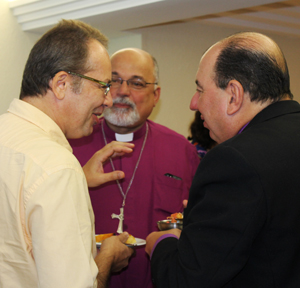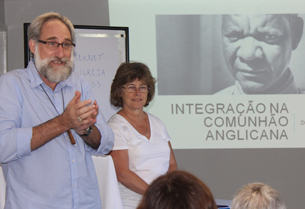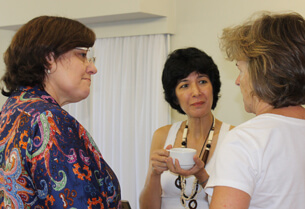A questão foi retirada do Evangelho de Lucas 10:29, após o relato da resposta de Jesus ao advogado que pergunta o que ele deve fazer para herdar a vida eterna:
Jesus respondeu com a pergunta: “O que está escrito na lei? ‘Ame o Senhor, o seu Deus, de todo o seu coração, de toda a sua alma, de todas as suas forças e de todo o seu entendimento’ e ‘Ame o seu próximo como a si mesmo'”.
O advogado então pergunta a Jesus: “E quem é o meu próximo?” Jesus responde com a história do Bom Samaritano (Lucas,10:30-35).
Representantes de Angola, Brasil, Moçambique e Portugal estão presentes no encontro e todos responderam à questão a partir de suas experiências e desafios atuais, fornecendo uma ideia do seus próprios contextos e realidades.
Helen Van Koevering, presidente da União de Mães na diocese de Niassa, em Moçambique, disse: “A enchente recente na nossa região nos revelou o que significa ser o próximo para aqueles que estão perto de nós. Nós temos a oportunidade de responder devido às relações que construímos com a comunidade e com os parceiros na Comunhão Anglicana. Nós temos uma relação de confiança e amizade com nossos próximos no mundo todo, assim como com aqueles que têm necessidade na nossa comunidade local.”
As respostas dos participantes evidenciaram não apenas o modo como podemos interpretar a palavra “próximo”, como também as situações com as quais as igrejas estavam lidando no local.
Mauricio Andrade, bispo da diocese de Brasília, Brasil, disse: “Brasília parece ser uma cidade moderna e os visitantes não compreendem a quantidade de pobreza que existe. Nosso grande desafio é a necessidade das pessoas nas ruas, os sem-teto — este é o meu próximo.”
Andre Soares, bispo de Luanda, Angola, disse: “Angola é rica em diamantes e petróleo, mas isso não reflete a riqueza da sociedade; os índices de malária são muito altos e há mortes todos os dias. Nossos próximos são aqueles que vivem ao nosso redor.”
Muitos enfatizaram a importância de reconhecer a variedade de necessidades na resposta ao próximo, que são aqueles “que vivem ao nosso redor”, mas também aqueles que estão em um contexto global abrangente.
Jossias Solomone, de Limbombos, Moçambique, disse: “Uma pequena porcentagem da nossa população é rica, e mesmo que estejamos sempre tentando alcançar e servir aos pobres no nosso trabalho, é importante reconhecer que tanto os pobres como os ricos são os nossos próximos.”
José Jorge Pina Cabral, bispo da diocese de Porto, Portugal, enfatizou que mesmo sendo Portugal um país europeu, seus níveis de pobreza ainda são altos e continuam aumentando. Recentemente, a igreja deu assistência a uma jovem e sua mãe para que viajassem a outra cidade portuguesa para visitar o irmão da menina, a quem não viam há anos. José disse: “A questão nos ajuda a perceber as necessidades daqueles que estão ao nosso redor, mesmo quando elas nos surpreendem. Não se trata de uma pergunta retórica; devemos nos lembrar de pensar em quem é o nosso próximo e como podemos serví-lo. Precisamos estar atentos à diversidade de necessidades ao nosso redor.”
O Arcebispo Francisco da Silva, primado do Brasil, conduziu as apresentações, enquanto o Bispo João Câncio Peixoto, de Recife, onde o encontro foi realizado, dava as boas-vindas ao grupo.
 Os participantes avançaram para a segunda sessão e discutiram suas esperanças e expectativas em relação ao encontro. Uma declaração muito repetida refletiu o desejo das igrejas de língua portuguesa de se encontrarem e colaborarem nos seus trabalhos: “É um sonho que se tornou realidade! Muitas pessoas esperavam por esse momento há muitos anos e agora pudemos realizá-lo.”
Os participantes avançaram para a segunda sessão e discutiram suas esperanças e expectativas em relação ao encontro. Uma declaração muito repetida refletiu o desejo das igrejas de língua portuguesa de se encontrarem e colaborarem nos seus trabalhos: “É um sonho que se tornou realidade! Muitas pessoas esperavam por esse momento há muitos anos e agora pudemos realizá-lo.”
Todos os representantes estavam ansiosos por compartilhar seus contextos e por aprender uns com os outros, e muitos anteciparam que o encontro seria o ínicio de uma nova colaboração por toda a comunidade anglicana.
Christina Whinnischofer, presidente da União de Mulheres Anglicanas no Brazil (UMEAB), disse: “Estamos ansiosos por compartilhar experiências, criar conexões e solidariedade entre as igrejas lusófonas, partilhando recursos e mantendo o contato.”
A ideia da criação de um encontro baseado na língua não inglesa foi algo que os participantes receberam como uma inovação bem-vinda na comunidade anglicana. Eles lembraram que a maioria dos encontros são organizados em inglês, o que dificulta a participação plena de alguns.
O reverendo Kiaku Eduardo Avelino de Luanda, Angola, disse: “Esse encontro significa que as vozes de diferentes países de diferentes contextos poderão ser ouvidas – estamos aumentando a voz dos silenciados!”
Representantes de Angola e Moçambique também enfatizaram as necessidades linguísticas diversas mesmo  dentro de seus próprios países: em Moçambique, por exemplo, são faladas 16 línguas diferentes. Helen disse: “Há uma grande necessidade de que essas vozes sejam reconhecidas e de que as pessoas nessas disoceses sejam ouvidas e ouçam também o resto da comunidade anglicana.”
dentro de seus próprios países: em Moçambique, por exemplo, são faladas 16 línguas diferentes. Helen disse: “Há uma grande necessidade de que essas vozes sejam reconhecidas e de que as pessoas nessas disoceses sejam ouvidas e ouçam também o resto da comunidade anglicana.”
O encontro inspirou os representantes dos países lusófonos de toda a comunidade anglicana a vê-lo como o início de uma nova era de comunicação e colaboração, aumentando o acesso aos recursos e ao aprendizado no mundo todo e reconhecendo as vozes daqueles que não são ouvidos com frequência.
Mais informações sobre o encontro e sobre o webinar que será realizado para participantes lusófonos no dia 27 de Fevereiro de 2015 poderão ser acessadas em: https://anglicanalliance.org/news/20027/
————————————————————————————————-
ENGLISH
“Quem é o meu próximo?” First session at Lusophone meeting asks, ‘Who is my neighbour?’
In the opening session of the Anglican Alliance’s first Lusophone meeting – arranged in collaboration with Us (formerly USPG) and the Episcopal Anglican Church of Brazil – participants studied the story of the Good Samaritan and discussed who our neighbour is today.
The question was taken from Luke 10:29, following the account of Jesus answering a lawyer who asks what he must do to inherit eternal life:
Jesus answered saying, “What is written in the law? … ‘Love the Lord your God with all your heart and with all your soul and with all your strength and with all your mind; and, ‘Love your neighbour as yourself.'”
The lawyer then questions Jesus, “And who is my neighbour?” Jesus replies with the story of the Good Samaritan (Luke 10:30-35).
Representatives from Angola, Brazil, Mozambique and Portugal are attending the meeting, and all responded from their own experiences and current challenges, giving an insight into their contexts and realities.
Helen Van Koevering, President of the Mothers’ Union in the diocese of Niassa, Mozambique, said, “The recent flooding in our region has revealed to us what it means to be a neighbour to those around us. We have the opportunity to respond because of the relationships we have built with the community and with partners in the Anglican Communion. We have trust and friendship with our neighbours around the world, as well as those in need in our local community.”
Responses from the participants highlighted not only the way we can interpret the word ‘neighbour’, but also the situations that churches were facing on the ground.
Mauricio Andrade, bishop of the diocese of Brasilia, Brazil, said, “Brasilia looks like a modern city, and visitors don’t always understand how much poverty there is. Our greatest challenge is the needs of the people on the streets, the homeless beggars – this is my neighbour.”
Andre Soares, bishop of Luanda, Angola, said, “Angola is rich in diamonds and oil, but this is not reflected in the richness of society; rates of malaria are very high and there is death every day. Our neighbours are those who live all around us.”
Many highlighted the necessity to recognise the diversity of needs in responding to our neighbours, who are “those who live all around us”, as well as those in our wider global contexts.
Jossias Solomone, from Limbombos, Mozambique, said, “A small percentage of or population is rich, so whilst we are always trying to reach and serve the poor in our work it is important to recognise that both rich and poor are our neighbours.”
José Jorge Pina Cabral, bishop of the diocese of Porto, Portugal, highlighted that whilst Portugal was a European country, levels of poverty were still high and in fact increasing. Recently the church there had supported a young girl and her mother to travel to another Portuguese city to visit the girl’s brother, as they had not seen each other for years. José said, “This question helps us to realise the needs of those around us, even if they surprise us. It is not a rhetorical question; we must remember to think about who our neighbour is and how we can serve them. We need to be alert to the diversity of needs around us.”
Archbishop Francisco da Silva, Primate of Brazil, led introductions, whilst Bishop Joao Cancio Peixoto, bishop of Recife, where the meeting was hosted, welcomed the group to the diocese.
 Participants went on in the second session to discuss their hopes and expectations for the meeting. A much-repeated statement reflected the yearning of Portuguese-speaking churches to meet and collaborate on their work: “This is a dream come true! Many people have been hoping for this moment for many years, and now we can see it in reality.”
Participants went on in the second session to discuss their hopes and expectations for the meeting. A much-repeated statement reflected the yearning of Portuguese-speaking churches to meet and collaborate on their work: “This is a dream come true! Many people have been hoping for this moment for many years, and now we can see it in reality.”
All representatives were looking forward to sharing from their contexts and learning from each other, and many anticipated that the meeting would be the start of a new collaboration across the Anglican Communion.
Christina Whinnischofer, President of the Union of Anglican Women in Brazil (UMEAB), said, “We are looking forward to exchanging experiences, building connections and solidarity among Lusophone churches, sharing resources and staying in touch.”
The idea that holding a language-specific meeting in a language other than English was something that struck participants as a welcome innovation in the Anglican Communion. They noted that most meetings are held in English, which can make it difficult for some to participate fully.
Revd Kiaku Eduardo Avelino from Luanda, Angola, said, “This meeting means that the voices of different countries and contexts can be heard – we are raising the voices of the silenced!”
Representatives from Angola and Mozambique also highlighted the diverse language-needs even within their countries – for example 16 different languages are spoken in Mozambique. Helen said, “There is a great need for these voices to be recognised and for the people in these dioceses to have their voices heard, and to hear from the rest of the Anglican Communion.”
The meeting has inspired representatives in Lusophone countries across the Anglican Communion to see this as the launch of a new era of communication and collaboration, increasing access to resources and learning worldwide and recognising the voices of those not often heard.
More information about the meeting that is taking place, and the webinar that will be held for Lusophone speakers on 27 February 2015, can be seen at https://anglicanalliance.org/news/20027/
Participants
Brasilia, Brazil
Mauricio Andrade, Bishop
Sandra Andrade, Coordinator of Brazil’s Anglican Service for Diaconia and Development (SADD)
Concordia SC, Brazil
Jordan Santos, Episcopal Anglican Youth in Brazil
Porto Alegre, Brazil
Francisco Silva, Primate of Brazil
Recife, Brazil
Joao Cancio Peixoto, Bishop
David Lira, Theologian
Lilian Lira, Theologian
Joanildo Burity, ACC representative
São Paulo, Brazil
Manuel Ernesto, Suffragan Bishop
Arthur Calvacante, Provincial Secretary General
Pedro Triana, CEA
Christina Whinnischofer, UMEAB
Paulo Ueti, Anglican Alliance
Luanda, Angola
Andre Soares, Bishop
Kiaku Eduardo Avelino, Deão
Suzana Ventura Lopes Alexandre, President of the Mothers’ Union (absent due to sickness)
London, UK
Joabe Cavalcanti, Us Trustee
Christina Manning, Anglican Alliance
Lichinga, Mozambique
Mark Van Koevering, Bishop
Helen Van Koevering, President of the Mothers’ Union
Maputo, Mozambique
Carlos Simeao Matsinhe, Bishop
Joana Chilengue, President of the Mothers’ Union
Jossias Solomon, Young Adults representative
Porto, Portugal
José Jorge Pina Cabral, Bishop
Brígida Arbiol Pereira, President of the Mothers’ Union
Antonio Manuel Silva, Institute of Anglican Theological Studies
Pictures
1. Brígida Arbiol Pereira (Porto,Portugal), Christina Whinnischofer (Sao Paulo, Brazil) and Helen Van Koevering (Niassa, Mozambique)
2. Joanildo Burity (Anglican Consultative Council), Mauricio Andrade (Brasilia, Brazil) and Joao Cancio Peixoto (Recife, Brazil)
3. Mark and Helen Van Koevering, from the Anglican Church in Lichinga, Niassa, Mozambique
4. Paulo Ueti (Anglican Alliance), Joabe Cavalcanti (Us), and Sandra Andrade (SADD).

